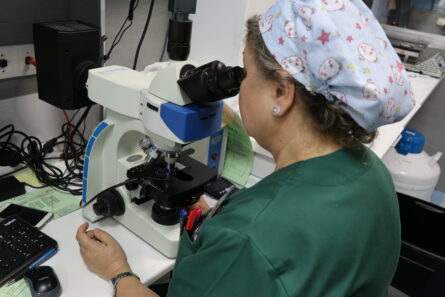The article has had the participation of more than 200 patients and has been published in one of the main scientific journals of reproductive medicine “Fertility & Sterility”.
TheSCD technique is used in clinical practice (Halosperm ®) to measure sperm DNA fragmentation, which is a marker of chromatin damage, the material from which they are compound chromosomes.

This damage occurs during the process of sperm formation, their transit through the seminal pathways -mainly in the epididymis- and, sometimes, post ejaculation< /strong> for improper handling of samples in the laboratory. Other types of factors such as varicocele, lifestyle, exposure to toxins, age, infections, etc. can condition the quality of the ejaculate in terms of DNA quality.
In this sense, the presence of high levels of sperm DNA fragmentation can cause adverse effects on natural fertility, embryonic development and implantation , in addition to increasing the risk of spontaneous abortion and the health of the offspring.
The research, which at Ginemed has been led by Mercedes González, head of the group's Andrology Area, is the first to examine the reliability of the SCD technique< /strong> to evaluate sperm DNA fragmentation in men with infertility.
The study has included the participation of 219 patients, of which 2 ejaculates from each of them were analyzed in an interval of 3 months. According to the sperm DNA fragmentation values, they were classified as follows:
- Normal: ≤ 20%
- Intermediate: 21-29%
- High: ≥ 30%
In the case of subjects with normal or high values, the degree of agreement between the two samples was 80% (3 out of 4), while in those with presented intermediate values was 60% (4 out of 10).
On the other hand, the number of patients who went from intermediate to normal in the second test was similar to that of those who went from intermediate to high. However, in no case in the second test were 2 levels exceeded, that is, neither from normal to high nor vice versa.
Patients with intermediate and high values of sperm DNA fragmentation reflect a paternal factor that contributes to infertility, although with different magnitude, so, in most cases, it is possible to repeat the test does not imply a change in the clinical management of the patient.
However, repeating the test could be indicated in patients with intermediate values, who are likely to improve with appropriate therapies such as varicocele intervention, hormonal treatment or use of testicular sperm .



No hay comentarios